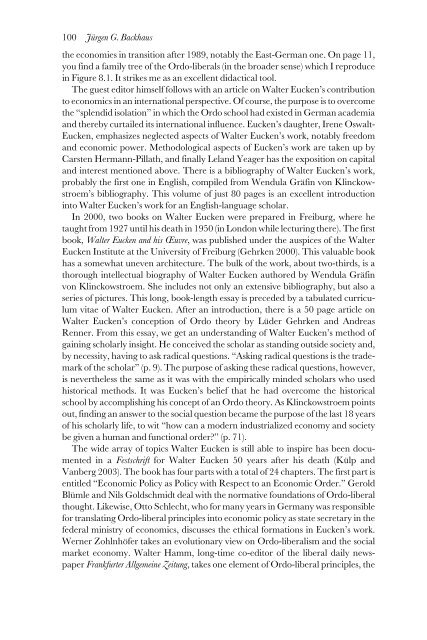Money and Markets: Essays in Honor of Leland B. Yeager
Money and Markets: Essays in Honor of Leland B. Yeager
Money and Markets: Essays in Honor of Leland B. Yeager
Create successful ePaper yourself
Turn your PDF publications into a flip-book with our unique Google optimized e-Paper software.
100 Jürgen G. Backhausthe economies <strong>in</strong> transition after 1989, notably the East-German one. On page 11,you f<strong>in</strong>d a family tree <strong>of</strong> the Ordo-liberals (<strong>in</strong> the broader sense) which I reproduce<strong>in</strong> Figure 8.1. It strikes me as an excellent didactical tool.The guest editor himself follows with an article on Walter Eucken’s contributionto economics <strong>in</strong> an <strong>in</strong>ternational perspective. Of course, the purpose is to overcomethe “splendid isolation” <strong>in</strong> which the Ordo school had existed <strong>in</strong> German academia<strong>and</strong> thereby curtailed its <strong>in</strong>ternational <strong>in</strong>fluence. Eucken’s daughter, Irene Oswalt-Eucken, emphasizes neglected aspects <strong>of</strong> Walter Eucken’s work, notably freedom<strong>and</strong> economic power. Methodological aspects <strong>of</strong> Eucken’s work are taken up byCarsten Hermann-Pillath, <strong>and</strong> f<strong>in</strong>ally Lel<strong>and</strong> <strong>Yeager</strong> has the exposition on capital<strong>and</strong> <strong>in</strong>terest mentioned above. There is a bibliography <strong>of</strong> Walter Eucken’s work,probably the first one <strong>in</strong> English, compiled from Wendula Gräf<strong>in</strong> von Kl<strong>in</strong>ckowstroem’sbibliography. This volume <strong>of</strong> just 80 pages is an excellent <strong>in</strong>troduction<strong>in</strong>to Walter Eucken’s work for an English-language scholar.In 2000, two books on Walter Eucken were prepared <strong>in</strong> Freiburg, where hetaught from 1927 until his death <strong>in</strong> 1950 (<strong>in</strong> London while lectur<strong>in</strong>g there). The firstbook, Walter Eucken <strong>and</strong> his Œuvre, was published under the auspices <strong>of</strong> the WalterEucken Institute at the University <strong>of</strong> Freiburg (Gehrken 2000). This valuable bookhas a somewhat uneven architecture. The bulk <strong>of</strong> the work, about two-thirds, is athorough <strong>in</strong>tellectual biography <strong>of</strong> Walter Eucken authored by Wendula Gräf<strong>in</strong>von Kl<strong>in</strong>ckowstroem. She <strong>in</strong>cludes not only an extensive bibliography, but also aseries <strong>of</strong> pictures. This long, book-length essay is preceded by a tabulated curriculumvitae <strong>of</strong> Walter Eucken. After an <strong>in</strong>troduction, there is a 50 page article onWalter Eucken’s conception <strong>of</strong> Ordo theory by Lüder Gehrken <strong>and</strong> AndreasRenner. From this essay, we get an underst<strong>and</strong><strong>in</strong>g <strong>of</strong> Walter Eucken’s method <strong>of</strong>ga<strong>in</strong><strong>in</strong>g scholarly <strong>in</strong>sight. He conceived the scholar as st<strong>and</strong><strong>in</strong>g outside society <strong>and</strong>,by necessity, hav<strong>in</strong>g to ask radical questions. “Ask<strong>in</strong>g radical questions is the trademark<strong>of</strong> the scholar” (p. 9). The purpose <strong>of</strong> ask<strong>in</strong>g these radical questions, however,is nevertheless the same as it was with the empirically m<strong>in</strong>ded scholars who usedhistorical methods. It was Eucken’s belief that he had overcome the historicalschool by accomplish<strong>in</strong>g his concept <strong>of</strong> an Ordo theory. As Kl<strong>in</strong>ckowstroem po<strong>in</strong>tsout, f<strong>in</strong>d<strong>in</strong>g an answer to the social question became the purpose <strong>of</strong> the last 18 years<strong>of</strong> his scholarly life, to wit “how can a modern <strong>in</strong>dustrialized economy <strong>and</strong> societybe given a human <strong>and</strong> functional order?” (p. 71).The wide array <strong>of</strong> topics Walter Eucken is still able to <strong>in</strong>spire has been docu -mented <strong>in</strong> a Festschrift for Walter Eucken 50 years after his death (Külp <strong>and</strong>Vanberg 2003). The book has four parts with a total <strong>of</strong> 24 chapters. The first part isentitled “Economic Policy as Policy with Respect to an Economic Order.” GeroldBlümle <strong>and</strong> Nils Goldschmidt deal with the normative foundations <strong>of</strong> Ordo-liberalthought. Likewise, Otto Schlecht, who for many years <strong>in</strong> Germany was responsiblefor translat<strong>in</strong>g Ordo-liberal pr<strong>in</strong>ciples <strong>in</strong>to economic policy as state secretary <strong>in</strong> thefederal m<strong>in</strong>istry <strong>of</strong> economics, discusses the ethical formations <strong>in</strong> Eucken’s work.Werner Zohlnhöfer takes an evolutionary view on Ordo-liberalism <strong>and</strong> the socialmarket economy. Walter Hamm, long-time co-editor <strong>of</strong> the liberal daily newspaperFrankfurter Allgeme<strong>in</strong>e Zeitung, takes one element <strong>of</strong> Ordo-liberal pr<strong>in</strong>ciples, the
















